
Clean water changes everything
Clean water is essential to life. It is estimated that 768 million people are without access which has a direct impact on health, education, and economic opportunity.
Donating to the construction of water systems in afflicted communities keeps children in school, protects the young and the old from disease, and empowers men and women to raise livestock and agriculture to sustain their needs.
Life revolves around water
The same thing that provides our lives with comfort is limiting the quality of life for millions worldwide — water.
Each year, 543 million school days are lost from water-related challenges and illnesses. Dirty drinking water kills 1000 children daily through diarrhea, typhoid, cholera, dysentery and other water-borne illnesses. That means more people die every year… Lack of access to the clean drinking water means a less prosperous community.
It’s impossible to overstate the importance of clean drinking water. Access to clean water keeps children in school, prevents early death, and reduces poverty by enabling communities to build an economy and agriculture for trade and sustenance.
WAHU, is on the ground in the most drought-stricken areas to provide vulnerable communities with clean drinking water. To ensure that WASH (Water, Sanitation, Hygiene) programs are tenable, we work with local partners who are more intimate with the challenges of their communities to find and implement practical and effective solutions.
Programs are only one part of the strategy. The second is staffing, training, and equipping programs with human resources on the ground. We invest in community members to manage and reinforce WASH programs and their infrastructure for lasting and sustainable change, maximizing donor impact and elevating the community for generations.
Water Situation in Congo and Some Countries in Africa
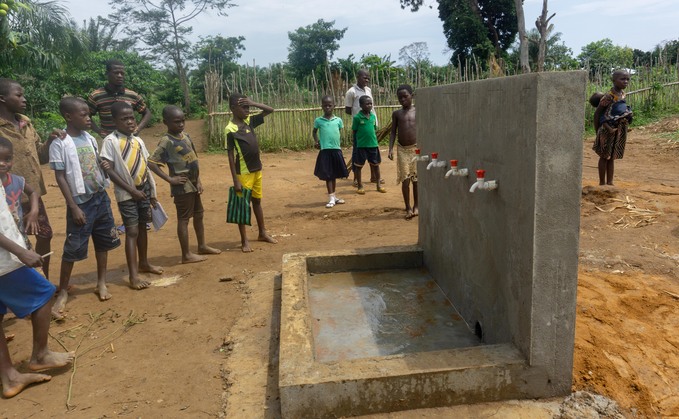
Building a well can change the life of an entire community.
You can save lives and improve the health of vulnerable populations by financing the construction of wells in rural areas. Your well will be built in a location easily accessible to all residents of the village. Wells can be constructed in various developing countries, taking into account the specific conditions of the region.
Build a Well is one of the best voluntary charities.
How would you like to contribute to humanitarian actions that will continue to bring lasting benefits to vulnerable people, even after your death? This is the vocation of voluntary charity. It is continuous alms-giving, it symbolizes the gift par excellence to multiply the impact of your generosity. The construction of wells responds to an immediate humanitarian need.

Every day, you help to provide drinking water for many people, make life easier for hundreds of women and children who walk several kilometres every day to fetch drinking water, and help to prevent water-borne diseases, which are one of the main causes of death in developing countries. We need your help!
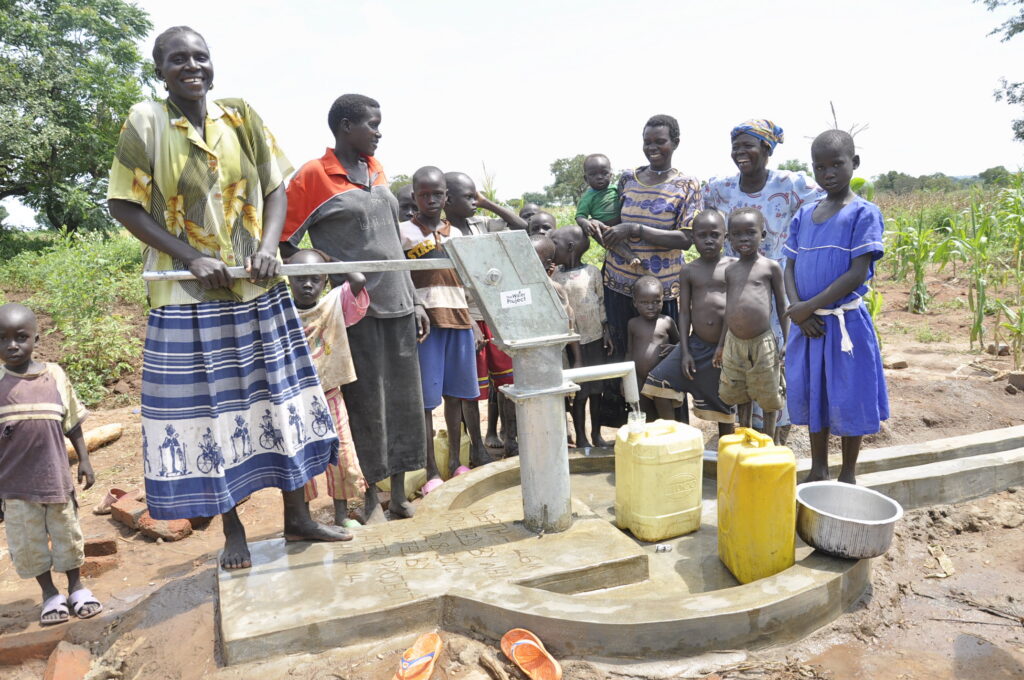
Your help can transform lives: get involved in sustainable projects that support communities in need.
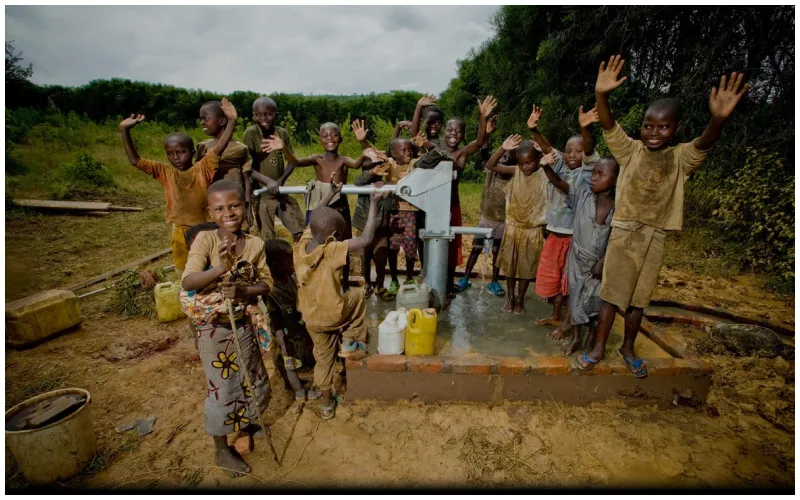
General: Dark wells
Deep wells, also known as filter point wells or instantaneous wells, are water collection structures made by directly sinking a perforated casing down to the water table in soft or medium hard soils. This aquifer is recharged mainly through the infiltration of rainwater into the ground.
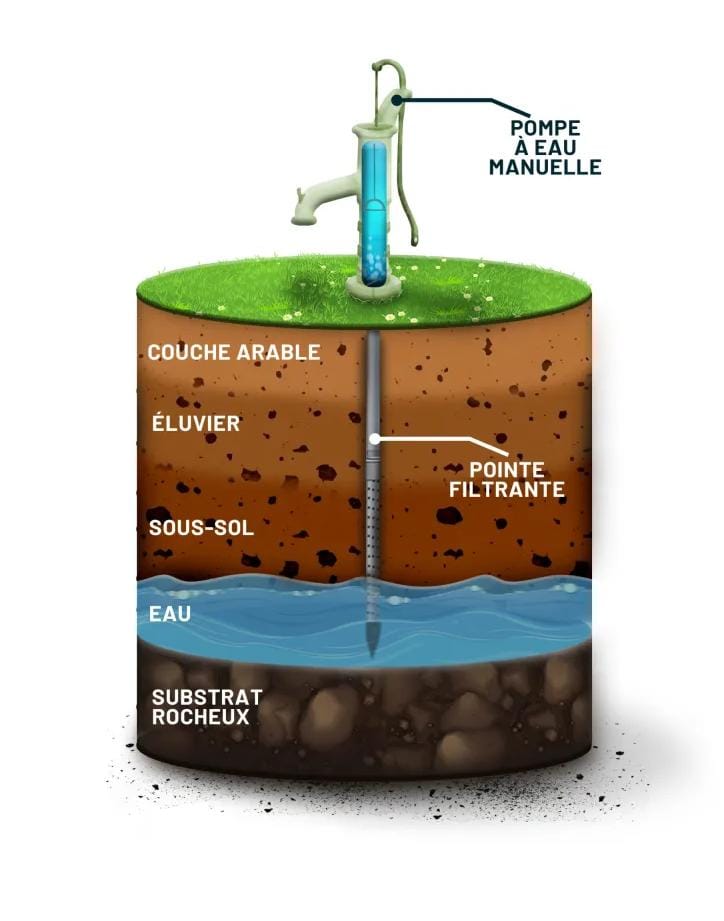
Features :
Tubage perforé : Le puits foncé est constitué d’un tube perforé à bout pointu appelé tubage. Ce tubage est muni d’un filtre à son extrémité pour permettre le passage de l’eau tout en retenant les particules fines du sol (comme le sable et d’autres débris).
Techniques de fonçage : Plusieurs techniques de fonçage sont utilisées :
Fonçage par battage : En utilisant un outil lourd (trépan) fixé à une corde ou un câble, l’outil est soulevé et relâché pour fragmenter le terrain et enfoncer le tubage.
Fonçage par injection d’eau : L’eau est injectée sous pression à l’intérieur du tube. La pression provoque la sortie de l’eau au fond du trou à l’extérieur du tube, facilitant l’enfoncement successif des tronçons du tube.
Fonçage par havage : Un gros tubage circulaire est construit sur le sol. En creusant à l’intérieur de ce tubage, le poids du tubage pousse progressivement celui-ci vers le bas pendant que le creusage s’effectue.
- Profondeur et diamètre : Ces puits sont généralement peu profonds, avec des profondeurs variant de moins de 15 à 40 mètres, selon la technique et la nature du sol. Ils peuvent avoir un diamètre allant de 25 à 100 mm jusqu’à plusieurs mètres dans le cas du fonçage par havage.
- Temps de construction : Construit en 5-8 jours
- Nombre de bénéficiaires : Jusqu’à 50 bénéficiaires
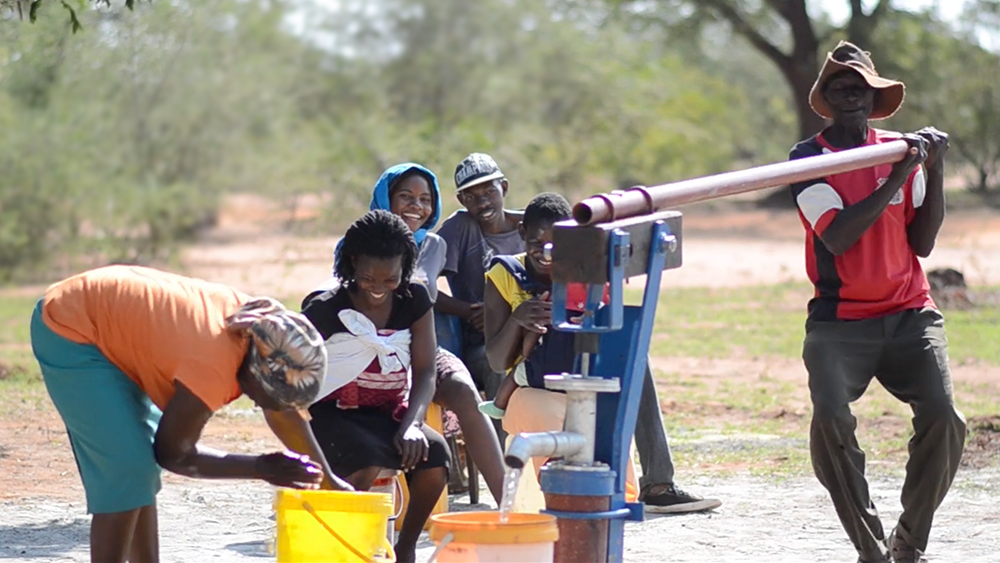
Realization :
Location selection: Location is chosen based on local geology to find a potential groundwater source.
Sinking process: Depending on the technique selected, the casing is gradually driven into the ground until it reaches the water table, where groundwater is accessible.
Advantages and disadvantages:
Advantages: Accessibility to drinking water for isolated communities, relatively low initial costs, adaptability to different soil types.
Disadvantages: Shallow depth, limitations in terms of maximum depth and appropriate geological conditions.
In summary
In summary, sink wells are structures allowing access to drinking water in areas where other more complex or expensive means are not available or financially viable. However, they have their own limitations in terms of depth.

Frequently Asked Questions
Can I choose the country where I want my well to be built?
While a donor may choose a water well in any African Countries, we cannot guarantee that we can fulfill requests for a specific country in two continents as we build wells where most needed. A donor may share their preference with us along with their receipt via email at info@wahu.co.za and we will try our best to fulfill their request; however, we cannot guarantee that they will be accommodated.
What is the cost of building a water well?
The price to build a water well is $7,000 in some other countries $12,500
Where do you build water wells?
W.A.H currently has water well projects in Congo ($7,000), Zambia ($7,000), Uganda ($12,500), Zimbabwe ($7,000) and South Africa ($7,000).
Can I add a name to the water well?
Yes, you may add an inscription of up to 45 characters to your water well. Please share your donation receipt along with your inscription with us via email at info@wahu.co.za
How long does it take for the water well to be built?
It takes between 1 to 2 months for well construction to be completed. This timeline excludes the pre- and post-construction phases, which should be noted. Please also note that unforeseen situations such as weather conditions, political unrest, and travel restrictions in the countries where we work can impact this timeline and may result in further delays.
Will I receive photos and videos of the well upon completion?
Yes, donors will receive photos of their completed wells and in some cases videos and construction photos of wells while they are in progress.
What is the lifespan of a water well?
Shallow water wells with hand pumps, which are most of the WAH’s water wells, have a lifespan of about 10-25 years.
